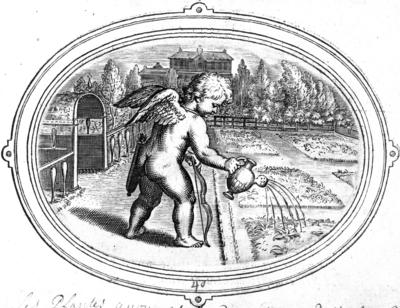Plantæ rigatæ magis crescunt [40]

Translations
 |
Planten die worden besproeid, groeien beter. |
 |
Watered flowers will grow better. |
Literature
- Praz, Seventeenth-Century Imagery
 , p. 110
, p. 110
- Sebastiàn, Lectura crítica
 , p. 27
, p. 27
Sources and parallels
- Watering plants in: In spiritu seminat [22] (in: Otto Vaenius, Amoris divini emblemata (1615))
[Compare
![Compare [compare]](/static/images/compare2.gif) ]
]
- Plantrigat magis crescunt [25] (in: Otto Vaenius, Emblemata aliquot selectiora amatoria (1618))
[Compare
![Compare [compare]](/static/images/compare2.gif) ]
]
- Praz compares this emblem to: Paradin, Princeliicke Deviisen
 , embl. 117
, embl. 117 -
Parallel for the pictura (mirrored) and the Latin motto (partly) in: Un Cupidon qui arrouse un Jardin (in: Daniel de la Feuille, Devises et emblemes (1691))
[Compare
![Compare [compare]](/static/images/compare2.gif) ]
]
References, across this site, to this page:
- Un Cupidon qui arrouse un Jardin (in: Daniel de la Feuille, Devises et emblemes (1691))
- In spiritu seminat [22] (in: Otto Vaenius, Amoris divini emblemata (1615))
- In spiritu seminat [22] (in: Otto Vaenius, Amoris divini emblemata (1615))
- Plantrigat magis crescunt [25] (in: Otto Vaenius, Emblemata aliquot selectiora amatoria (1618))
Iconclass
A cupid is watering a garden- water (one of the four elements)
[21D]

- groups of trees
[25G11]

- summer-house, arbour, garden-house (Dutch: 'theekoepel')
[41A622]

- fenced or walled garden; 'Hortus Conclusus'
[41A635]

- watering plants
[41A6811]

- gardening-tools (with NAME)
[41A682(WATERING CAN)]

- archer's weapons: bow
[45C15(BOW)]

- quiver
[45C23]

- Growth (+ emblematical representation of concept)
[51H5(+4)]

- Giving (+ emblematical representation of concept)
[55C2(+4)]

- (personifications and symbolic representations of) Love; 'Amore (secondo Seneca)' (Ripa) (+ emblematical representation of
concept)
[56F2(+4)]

- proverbs, sayings, etc. (with TEXT)
[86(PLANTAE RIGATAE MAGIS CRESCUNT)]

- other non-aggressive activities of Cupid
[92D156]

- attributes of Cupid (with NAME)
[92D18(BOW)]

- attributes of Cupid (with NAME)
[92D18(QUIVER)]

![[H O M E : Emblem Project Utrecht]](/static/images/rd-small.gif)


















































































































































